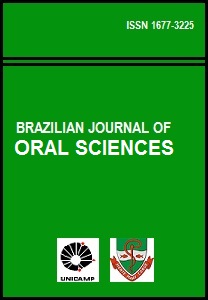Abstract
Previous studies have investigated the possible influences to different types of polymerization and polishing procedures in some properties of acrylic resins. Water sorption is an important property, which may be induced by these factors. The aim of this work was to evaluate water sorption in acrylic resin processed in microwave energy or water bath, after chemical and mechanical polishing. Forty heatpolymerized acrylic resin (Vipi-Cril, Dental VIPI Ltd, Pirassununga, São Paulo, Brazil) specimens were made according to ADA Specification No.12 for Denture Base Polymers and divided into 4 groups: Groups I and II were processed in microwave energy (500 W for 3 minutes); Groups III and IV, in water bath (73ºC ± 1ºC for 9 hours). Groups I and III were polished chemically; Groups II and IV were polished mecahnically. The specimens were submitted to water sorption test. The water sorption values (mg/cm2 ) were calculated and submitted to ANOVA and Tukey´s test (5% significance level). The obtained results were: Group I: 0.000953, Group II: 0.001069, Group III: 0.000958 and Group IV: 0.001491. No statistical difference were found among the groups (p>.05). Polymerization by microwave energy or water bath associated with chemical or mechanical polishing did not influence the water sorption of the heat polymerized acrylic resin evaluated.References
Phillips RW. Skinner dental materials. 9th ed. Rio de Janeiro: Guanabara Koogan; 1993. p. 140-60 2. Rizzatti-Barbosa CM, Del Bel Cury AA, Panzeri H. Influence of water sorption and microwave polymerization on denture adaptability. Rev Fac Odont S Paulo. 1995; 9: 197-206.
Pavan S, Arioli Filho JN, Dos Santos PH, Mollo Jr. FA. Effect of microwave treatments on dimensional accuracy of maxillary acrylic resin denture base. Braz Dent J. 2005; 16: 119-23 4. Rahal JS, Mesquita MF, Henriques GEP, Nóbilo MAA. Influence of chemical and mechanical polishing on water sorption and solubility of denture base acrylic resins. Braz Dent J. 2004; 15: 225-30.
Nishii M. Studies on the curing of denture base resins with microwave irradiation with particular reference to heat curing resins. J Osaka Dent Univ. 1968; 2: 23-40.
Von Fraunhofer JA, Suchatlampong C. The surface characteristics of denture base polymers. J Dent. 1975; 3: 105-9.
Araújo PA, Abreu D, Magalhães AGO. Properties of denture base polymers subjected to chemical polishing method. I – transversal, deflexion, hardness and deformations. Estomat Cult. 1972; 6: 40-4.
Gotusso MJ. Chemical and superficial treatment of acrylic resins. Rev Asoc Odontol Argent. 1969; 57, 359-61.
American Dental Association. Revised American Dental Association Specification N. 12 for denture base polymers. J Am Dent Assoc. 1975; 90: 451-8.
The Brazilian Journal of Oral Sciences uses the Creative Commons license (CC), thus preserving the integrity of the articles in an open access environment.

